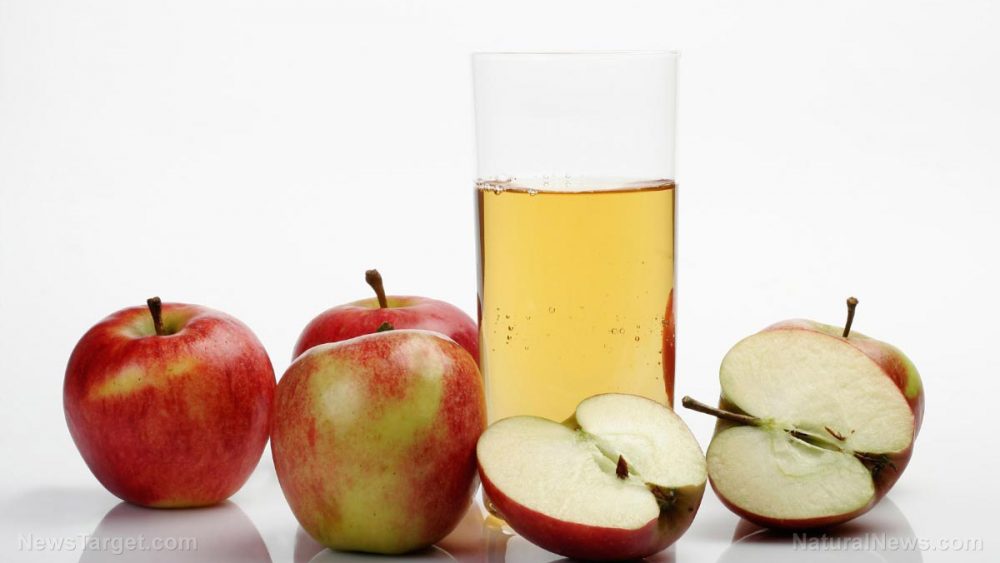
Advertisement
Fresh, organic apple juice is refreshing and nutritious. However, if you have acid reflux, you need to stop drinking apple juice – at least until you feel better.
Apple juice is a delicious beverage that’s full of vitamins and minerals. Rich in vitamin C, apple juice provides 159 percent of the Recommended Daily Intake (RDI).
Raw apple juice contains potassium, which helps manage your body’s acid-base balance. It also has vitamin K, which helps your blood coagulate and is vital for repairing bruises, cuts, or wounds.
The pH level of apple juice
The pH level of any substance decides if it is acidic or alkaline. The pH of apple juice usually depends on the type of apple, along with the freshness and ripeness of the fruit used to make the juice.
The pH of apple juice may vary from 3.35 to 4. The lower the pH, the more acidic a substance is. The processing method also affects the pH level of apple juice and its acidity affects its taste. A less acidic juice won’t taste as fresh while an extremely acidic juice will have a sharper taste. (Related: How to Enjoy Healthy and Balanced pH Levels with Acidic and Alkaline Foods.)
Apple juice and orange juice share similar acidic levels, but they have different acid profiles. The primary acid present in apple juice is malic acid, which is less bitter than the citric acid in orange juice.
Apple juice contains three acids: chlorogenic, malic, and quinic acid.
- Chlorogenic acid – Chlorogenic acid is an antioxidant that’s naturally produced by plants. In a study published in Food and Chemical Toxicology, researchers administered chlorogenic acid to mice. The results showed that the acid reduced their weight and triglyceride levels. Additionally, chlorogenic acid can reduce blood sugar spikes and the risk of diabetes.
- Malic acid – Malic acid is present in apple juice in larger quantities than other acids. It also offers the most benefits. The Association of Official Analytical Chemists (AOAC) reports that apple juice contains nonvolatile acids, phenolics, and sugars. The juice has the following acids: citric, fumaric, malic, quinic, and shikimic acid. Its phenolics include chlorogenic acid and hydroxymethylfurfural [HMF]. Apple juice has sugars like fructose, glucose, sorbitol, and sucrose.
- Quinic acid – A study from the journal Phytotherapy Research notes that quinic acid increases the levels of nicotinamide and tryptophan in healthy individuals. Tryptophan is converted into serotonin, a chemical that helps regulate sleep cycles and moods because it has a soothing effect on the brain. Meanwhile, nicotinamide helps the body produce enzymes to metabolize carbs, fats, and protein.
Drinking apple juice if you have acid reflux
When consumed moderately, apple juice is one of the healthiest beverages out there. It’s a different story, however, if you drink too much of it. Consuming high amounts of apple juice may cause side effects, particularly if you have acid reflux.
Acid reflux occurs when your stomach acid leaks back up your esophagus. If you are suffering from acid reflux, apple juice may worsen your symptoms.
These symptoms include:
- Belching
- Coughing
- Dyspepsia
- Heartburn
- Hoarseness
- Nausea
- Regurgitation
- A sour taste in the mouth
- Sore throat
Another side effect to drinking too much apple juice is dental erosion. It damages the structure of your teeth and causes pain or sensitivity to cold or hot food and beverages.
Since apple juice has a low pH, it may soften tooth enamel until the saliva balances the acid-base levels in the mouth. The Academy of General Dentistry warns that regularly consuming acidic beverages can prevent the mouth from maintaining natural acidity levels. Drink apple juice with a straw to minimize your exposure to the acids.
The malic acid in apples is generally considered safe, but it may also cause gastrointestinal problems like bloating or cramping. To prevent these, drink other liquids aside from apple juice throughout the day to stay hydrated.
Remember that while organic apple juice is generally healthy, drinking too much of it – especially if you have acid reflux – can give you these health problems. Visit Organics.news for more articles highlighting the health benefits of organic fruit juices.
Sources include:
Advertisements







